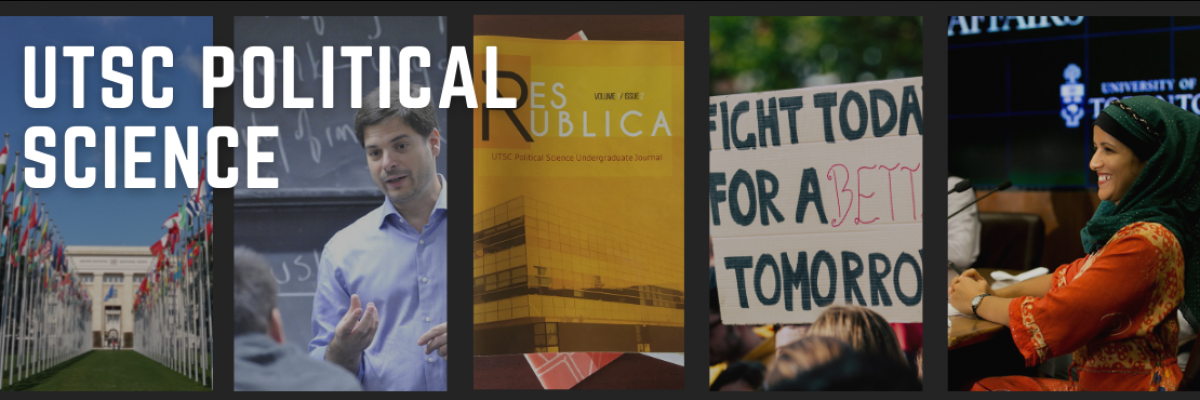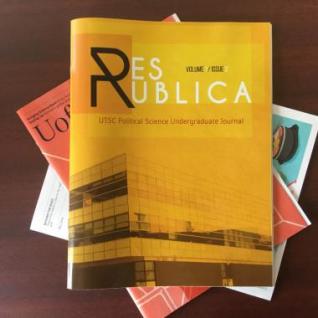Specialist Program in Political Science Specialist (HBA)
Admissions Category: Social Sciences & Humanities

Program Overview
The Department of Political Science prepares students for thoughtful citizenship in the 21st Century. In classes about globalization and climate change, corruption and violence, international conflict and cooperation, democracy and authoritarianism, ethnic and religious conflicts, ancient and modern philosophy, domestic and global public policy, and other critical areas, our faculty ground students in enduring traditions of systematic thought while equipping them with new tools and insights to make sense of the world. Students learn to see, think, and communicate about the bigger picture within which day-to-day politics play out.
Complementary Programs:
Minor Programs in International Development Studies, Philosophy, Economics for Management Studies, Applied Statistics.
Check out future career opportunities and skills acquired from completing this program:
Competencies & Skills
- Gather evidence to advance an argument in a variety of formats, including research papers, policy briefs, case studies, or book reviews
- Think globally and comparatively about pressing contemporary issues
- Identify and analyze diverse perspectives that can shape governance
- Analyze quantitative and qualitative data
- Design and execute empirical research projects
Careers for Graduates
- Policy Analyst/Advisor in Government
- Program Coordinator in Non-Profits
- Research Analyst in Think Tanks
- Public Relations Specialist
- Service Rep - Social and Community Service
- Political Aide/Consultant
- Lobbyist
- Public Opinion Analyst
- Foreign Service Officer
- Lawyer / Paralegal
Further Education
- Political Science
- Public Policy (many varieties)
- Public Administration/Service
- Business Administration
- Law
- Paralegal Studies
- Communications or Marketing
- Public Relations
- Community Service Management
Program Pathway
Year 1 | Year 2 | Year 3 | Year 4Choose Your Courses Wisely
- 1.0 credit in Introductory Political Science: POLA01H3, POLA02H3.
- 0.5 credit in Statistics: STAB23H3.
- Explore courses in other disciplines while fulfilling breadth requirements and electives for your degree.
- Use Degree Explorer Planner and the UTSC Calendar to plan your degree.
Develop Your Academic & Research Skills
Your first year courses (POLA01H3 and POLA02H3) are designed to introduce you to techniques of critical reading and analytical essay writing. We encourage you to contact the UTSC Library for assistance when completing your assignments for both courses. Writing support is also available at the CTL Writing Centre.
Apply Theory to Practice
- Consider applying for Alternative Reading Week, a short term volunteer program that runs during reading week where students learn to explore the concepts of learning through service and leadership for social change (sign up at DSL).
- Start building your Co-Curricular Record (CCR) and search for Experiential Learning opportunities.
Become an Engaged Citizen (Locally & Globally)
- Join the Political Science Students Association (PSSA) and attend their activities and events to connect with other students in your field of study.
- Explore other relevant student clubs on campus.
- Participate in Department of Student Life’s (DSL) LEAD program to build confidence, self-esteem and resiliency.
Plan for Your Future Career
- Volunteer with organizations to explore your interests in Political Science; check listings on CLNx (>Jobs & Recruitment).
- Establish a professional presence on social media (Linkedin, Twitter or blogs).
- Attend the UTSC Get Experience Fair in September and register with SCSU’s Volunteer Network Program.
Year 2
Choose Your Courses Wisely
- 1.0 credit in Political Theory: POLB72H3 and 0.5 credit from courses listed in the Political Theory area.
- 1.0 credit in Canadian Politics: POLB56H3 and POLB57H3.
- 2.0 credits from: POLB80H3, POLB81H3, POLB90H3, POLB91H3.
- Use Degree Explorer and consult with your Program Advisor to ensure you meet degree and program requirements.
Develop Your Academic & Research Skills
- Book an appointment with your program librarian for in-depth library research assistance.
- Explore the Political Science Resource Guide for Research.
- Check the Research Catalogue on (CLNx) for possible research opportunities.
Apply Theory to Practice
- Attend the University of Toronto Model Parliament (UTMP) conference to better understand the political processes to legitimize government, policy and law.
- Interested in global issues? Then join the University of Toronto Model United Nations (UTMUN).
- Join the Law Society of UTSC (LSOU) and participate in a mooting competition.
Become an Engaged Citizen (Locally & Globally)
- Join one of DSL’s Community Action Projects to apply academic learning and take action for social change through engagement opportunities in the Scarborough Community.
- Gain international experience by studying at an international host university for one term to one year through the Student Exchange Program through the ISC.
Plan for Your Future Career
- Gain experience by applying for a summer, part-time or Work Study position via CLNx (>Jobs & Recruitment).
- Considering grad school? Speak to professors and program advisors early so you are on track.
- Explore careers through the AA&CC’s Job Shadowing program and In The Field programs.
- Develop professional skills by joining a conference like TEDxUTSC.
Year 3
Choose Your Courses Wisely
- Complete your remaining methods course: POLC78H3.
- Start completing your applications courses within our five areas of concentration of the program: 5.0 credits in POL or PPG at the C- and/or D-level.
- Use Degree Explorer to ensure you are on track with your degree.
Develop Your Academic & Research Skills
- Consider competing for the UTSC Library Undergraduate Research Prize or Poster Forum.
- Conduct a summer research project under the supervision of eligible U of T faculty members with the University of Toronto Excellence Award.
Apply Theory to Practice
Consider contributing in leadership about an issue that is important to you in the UTSC community by running for a seat on the Campus Council, Governing Council or the Academic Affairs Committee.
Become an Engaged Citizen (Locally & Globally)
- Why not work abroad during a summer session? Visit the ISC and attend the GoGlobal Expo to connect with organizations that can help you make it happen.
- Intern with a Non-Governmental Organization in Ghana, Malawi, Sri Lanka or Tanzania with the Queen Elizabeth II Diamond Jubilee Scholarship Program; visit ISC for details.
Plan for Your Future Career
- Plan a career path with a staff member at the AA&CC.
- Check CLNx for networking events and employer information sessions.
- Attend the UTSC Graduate & Professional School Fair in September.
- Consider the AA&CC’s Partners in Leadership program to learn and network with an alumni mentor about transitioning to work or further education.
Year 4
Choose Your Courses Wisely
- Complete your remaining applications courses: 5.0 credits in POL or PPG at the C- and/or D-level.
- Fulfill the depth requirements by taking appropriate number of C- and D-level courses for your degree requirements.
- Use Degree Explorer to ensure you are on track to graduate.
- Register your “Intent to Graduate” on ACORN by the deadline.
Develop Your Academic & Research Skills
- Explore independent research courses such as POLD95H3 to delve deeper into research of interest with a faculty member.
- Apply for the Academic Travel Fund to conduct research, present at a conference, or engage with the international academic community.
- Submit your work to Res Publica, UTSC’s official Political Science Undergraduate Journal.
Apply Theory to Practice
- Consider volunteering in your local MP/MPP’s constituency office, and/or volunteering during an election if you are interested in working for a party as a constituency assistant, legislative assistant, policy advisor, or communications assistant.
- Explore summer internships or job opportunities in Political Science.
Become an Engaged Citizen (Locally & Globally)
- Apply for the Jaimie Anderson Parliamentary Internship to work with a Member of Parliament in Canada for the summer.
- Consider joining the Canadian Political Science Association; volunteer for their events and get to know people in your industry of interest.
Plan for Your Future Career
- Attend the AA&CC’s Get Hired job search conference in April/May.
- Attend the Jobs for Grads orientation for a job search “crash course”. Find job opportunities on CLNx.
- If you are considering grad school, discuss your plans early with staff at the AA&CC and your professors.
- Get your Personal Statement reviewed in the AA&CC.
